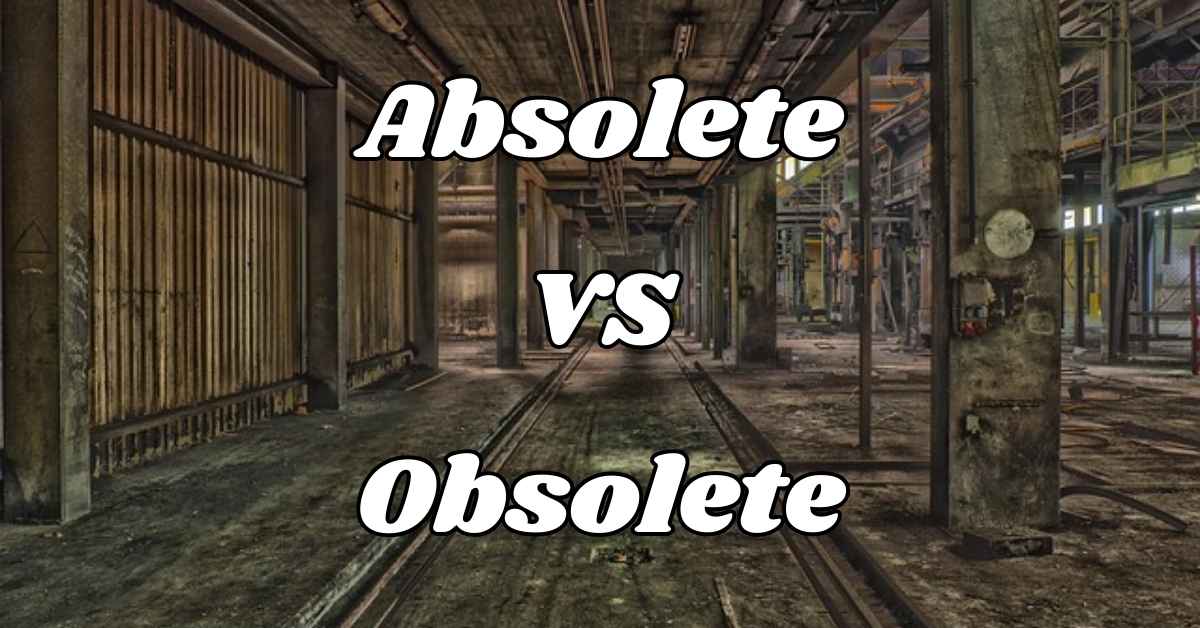Absolete vs Obsolete: Navigating the nuances of language in our rapidly evolving world can be tricky. This article clarifies the common confusion between absolete and obsolete, explaining why one is a valid word and the other isn’t.
We’ll delve into the definition and proper usage of obsolete, exploring its origins and providing examples of its use in various contexts. We’ll also address the misspelling “absolete,” explaining why it’s a common mistake and offering tips for avoiding it.
Understanding proper word usage is crucial for clear communication, especially in today’s dynamic world where technology evolution and cutting-edge innovations constantly reshape our language. This exploration of obsolete vs absolete will equip you with the knowledge to use the correct term confidently, ensuring your communication is both accurate and effective.
Understanding Absolete vs Obsolete
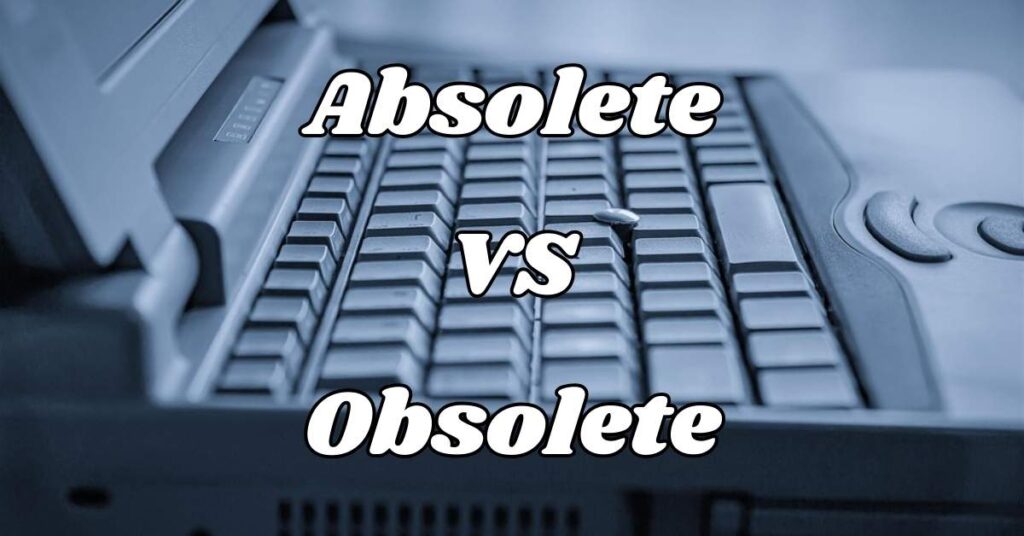
The difference between absolete and obsolete is simple: Obsolete is a valid word, while absolete is not. Many people misspell “obsolete” as “absolete,” likely due to the similar sounds and the prefix “ab-,” which often indicates something being taken away or absent.
However, in this case, it’s a misapplication. This confusion highlights the importance of grammar accuracy and contextual importance in communication. In today’s dynamic world, understanding the language evolution is crucial. Let’s embark on a journey to understand the nuances of these terms.
Origins of the Word Obsolete
The word “obsolete,” dating back to the 1570s, describes something no longer practiced or used, essentially out of date or discarded. It originates from the Latin “obsoletus,” meaning “grown old” or “worn-out,” derived from “obsolescere,” which signifies falling into disuse or becoming tarnished.
This Latin root combines “ob” (away) with “solere” (to be used to), highlighting the concept of something being removed from customary use.
Obsolete: Definition and Usage
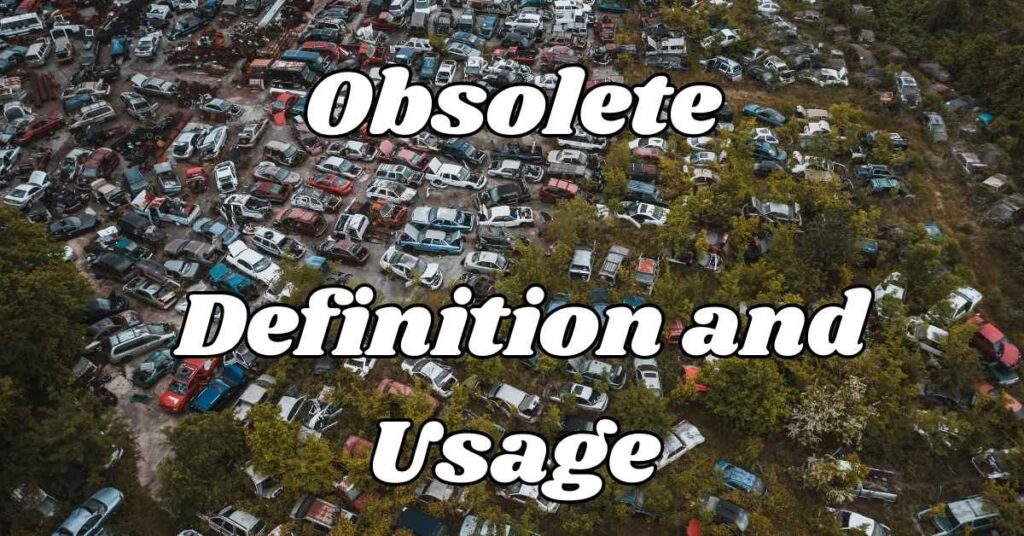
Obsolete describes something that is no longer in use or generally out of date, often because of new inventions or methods. It implies that the item, practice, or idea has been superseded by something newer and more efficient.
Think of rotary phones or VHS tapes; these are classic examples of technologies that have become obsolete due to advancements in telecommunications and video recording.
Understanding the concept of obsolescence is important in fields like technology, business, and even fashion, as trends and innovations constantly render older things obsolete.
Define Obsolete
Obsolete means no longer produced or used; out of date. It signifies that something has been replaced by something better, newer, or more efficient. A key element of obsolescence is that the item isn’t just old; it’s no longer functional or relevant in its original context.
For instance, a horse-drawn carriage is outdated, but a specific carriage in good condition might be a valuable antique. However, a broken carriage, unable to be used for its original purpose, could be considered obsolete.
How to pronounce “obsolete”
The pronunciation of “obsolete” is /ˌɒbsəˈliːt/. Breaking it down phonetically, it’s “ob-so-leet.” The emphasis is on the second syllable. A helpful way to remember it is to think of “ob so” as the first part.
Many online dictionaries offer audio pronunciations, which can be useful for learners. Practicing the pronunciation aloud can help you incorporate the word naturally into your vocabulary.
Obsolete Usage
“Obsolete” can function as an adjective, describing a noun (e.g., “obsolete technology”), or less commonly, as a verb (e.g., “to obsolete a product line”). As an adjective, it signifies that the noun is no longer in use.
As a verb, it means to cause something to become obsolete. Understanding the grammatical flexibility of “obsolete” will allow you to use it correctly in various contexts.
Uses “Obsolete” In A Sentence
- “Floppy disks are now obsolete.”
- “The technology became obsolete within a few years.”
- “Many ancient business models are now obsolete.”
- “The company decided to obsolete their old equipment.”
- “His ideas on the subject are obsolete.”
Synonyms of Obsolete
- Outdated
- Antiquated
- Old-fashioned
- Outmoded
- Anachronistic
- Superannuated
- Defunct
- Disused
- Expired
- Past it
Absolete: Definition and Usage
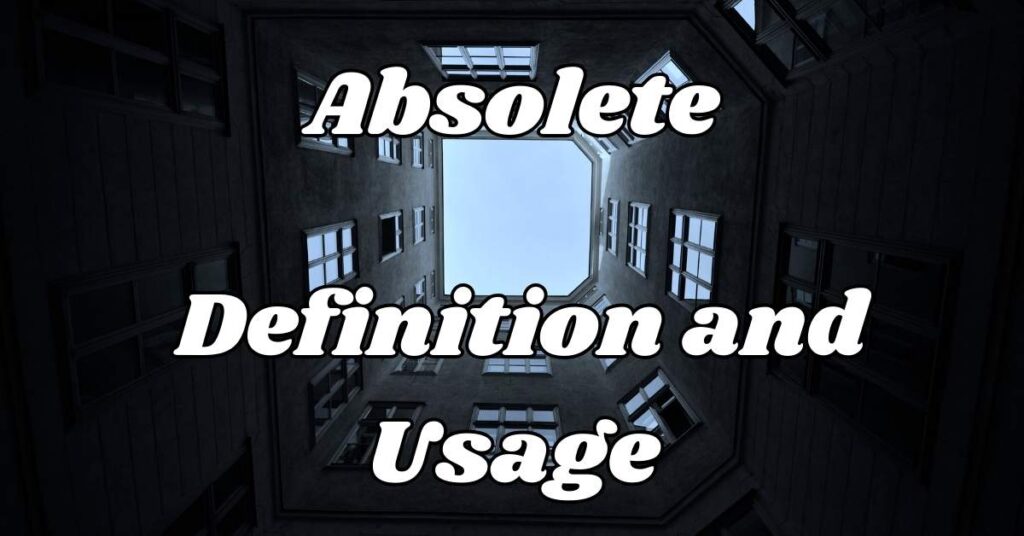
Absolete is not a real word. It is a misspelling of “obsolete.” Many people mistakenly use “absolete,” perhaps confusing it with other words that begin with the prefix “ab-,” which often indicates separation or removal.
However, in this case, the correct spelling is “obsolete,” and “absolete” has no recognized meaning or usage. It’s a common error, but one that’s easily corrected with a little attention to detail.
Absolete Define
Absolete has no recognized definition. It is not a valid word in the English language and does not appear in any standard dictionaries. If you encounter the word “absolete,” it is a misspelling of “obsolete.” Understanding this distinction is crucial for accurate communication.
Absolete Usage
Because absolete is not a real word, it has no correct usage. Any instance of “absolete” should be corrected to “obsolete.” The misspelling likely arises from the similar sounds of the two words and the common use of the “ab-” prefix.
Uses “Absolete” In A Sentence
- “The technology is absolete.” (Incorrect)
- “He used an absolete term.” (Incorrect)
- “They need to replace their absolete equipment.” (Incorrect)
- “The information is absolete.” (Incorrect)
- “This method is now absolete.” (Incorrect)
Side by Side Comparison
| Word | Meaning | Status |
| Obsolete | No longer in use; out of date | Correct |
| Absolete | Misspelling of “obsolete”; no meaning | Incorrect |
Everyday Usage Examples
“My old computer is practically obsolete now that I’ve upgraded to a new one.” “Fax machines are becoming obsolete in many offices.” “The concept of using punch cards to store data is now obsolete.”
These examples illustrate how “obsolete” is used in everyday language to describe things that are no longer used or relevant.
Obsolete Example in Context
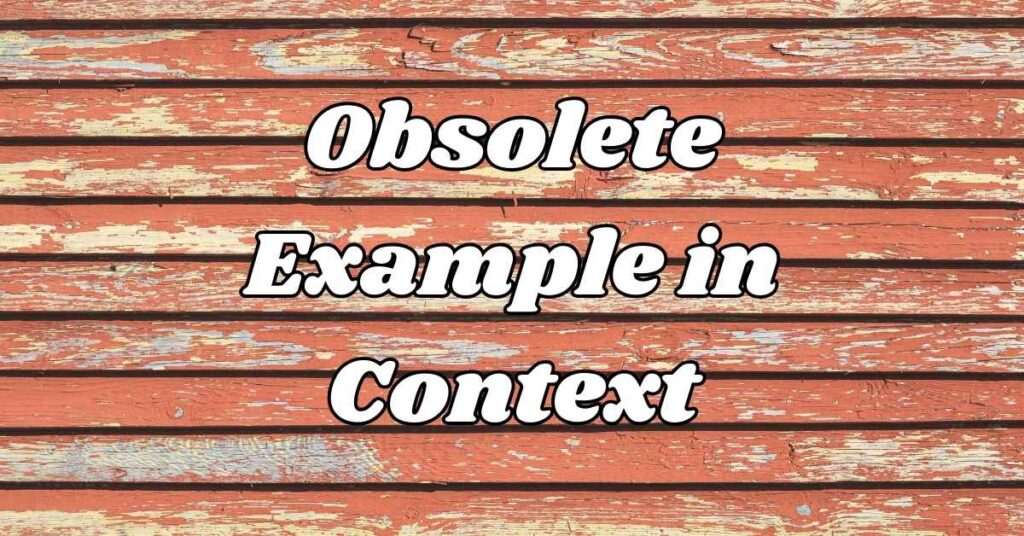
Imagine a museum of technology. A display might feature a collection of old cell phones, from bulky models with antennas to early smartphones.
The exhibit could explain how each model became obsolete as newer, more advanced phones were developed. This provides a clear example of obsolescence in action.
Technical Jargon
In industry speak, “obsolete” has a specific meaning. In tech development, for example, it may refer to hardware or software that is no longer supported. The use of specialized terms is common in various fields.
Regional Differences
While the core meaning remains consistent, there might be slight regional variations in how frequently or in what specific contexts the word is used. Understanding cultural influences is important.
Contextual Usage
The precise meaning of “obsolete” can vary slightly depending on the situation. For example, a piece of clothing might be considered obsolete in terms of fashion trends, while a piece of equipment might be obsolete due to technological advancements. The context significance is key.
Personal Interpretation
We all have our own experiences with things becoming obsolete. Think about items you used to own that are no longer common. This reflection can help you appreciate the rapidly changing world around us.
Common Mistakes To Avoid
The most common mistake is confusing “absolete” with “obsolete.” Another error is using “obsolete” simply to mean “old” or “outdated.” While something obsolete is usually old, it’s not simply the age that makes it obsolete; it’s the fact that it’s no longer used or produced.
Finally, some people might use “obsolete” in a broader sense than intended, applying it to things that are still somewhat in use, even if they are less common.
Using “Absolete” Instead Of “Obsolete”
The most frequent mistake is substituting “absolete” for “obsolete.” This simple spelling error can detract from the clarity and professionalism of your writing. Always double-check your spelling to ensure you’re using the correct term.
Using “Obsolete” To Mean “Outdated”
While “obsolete” often implies “outdated,” it specifically means something is no longer used or produced. A vintage car, for instance, might be outdated, but it’s not obsolete if it still runs and is used.
Not Considering Context
Using “obsolete” without considering the context can lead to misinterpretations. Calling a classic book “obsolete” is incorrect. While it may not be a current bestseller, it still holds literary value and is actively read.
Tips For Avoiding These Mistakes
The best way to avoid misspelling “obsolete” is to memorize its spelling and remember that “absolete” is not a word. If you’re unsure, always check a dictionary. To avoid misusing “obsolete,” consider whether the item or concept is truly no longer used.
If it’s just old or less common, a word like “outdated” or “antiquated” might be more appropriate. Paying attention to the context and meaning of the word will help you use it correctly.
More Article: Serface vs Surface: What’s the Difference
FAQS: Absolete vs Obsolete
Is it Absolete vs Obsolete?
The correct term is “obsolete”; “absolete” is a misspelling. Use “obsolete” to describe something no longer in use.
What is the term for obsolete?
“Obsolete” itself is the term for something that is no longer in use. Synonyms include outdated, antiquated, and defunct.
Is obsolescence the same as obsolete?
No. “Obsolescence” is the process of becoming obsolete, while “obsolete” describes the state of being no longer in use.
Conclusion
Absolete vs Obsolete The distinction is clear: “obsolete” is the correct term for something no longer in use, while “absolete” is a common misspelling. Mastering this difference enhances communication clarity, demonstrating attention to detail and language proficiency.
Understanding the nuances of word choice, especially in our rapidly evolving technological landscape, is crucial. By remembering the correct spelling and usage of “obsolete,” you ensure your communication remains accurate and effective, avoiding a common pitfall and projecting a polished, professional image.
More Post: Usage or Useage: What’s the Difference?

